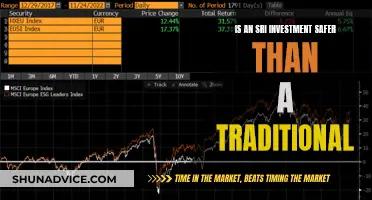
Ethereum is a dominant force in the crypto market, but that doesn't mean it's risk-free. It is a global computer for running decentralised apps, and its cryptocurrency, Ether, is the second-largest by market capitalisation. Ethereum has a volatile price history, but its smart contract functionality has enabled the development of decentralised applications and other blockchain innovations.
The crypto market is strongly volatile and unstable, and even digital assets with multi-billion-dollar market capitalisation cannot be called reliable. However, Ethereum has a positive outlook as it undergoes upgrades designed to enhance scalability, security, and sustainability. Its robust developer community and increasing use for decentralised applications and smart contracts support its long-term potential.
Ethereum's capacity to serve as a platform for other technologies and services is one reason some investors are upbeat about its future. It is a foundational layer for a large number of financial and non-financial protocols, and it allows for the development of smart contracts, which are contracts that automatically execute themselves based on the code written within them.
However, like any investment, there are risks involved, including market volatility, regulatory uncertainties, and high transaction fees. It's important to do thorough research and understand your risk tolerance before deciding to invest in Ethereum.
| Characteristics | Values |
|---|---|
| Purpose | Ethereum is a global computer for running decentralized apps (dApps). Ether (ETH) is the cryptocurrency that powers the Ethereum network. |
| Store of value | Ether is a good store of value, but many prefer Bitcoin because of its hard-capped supply. |
| Smart contracts | Ethereum supports smart contracts, which Bitcoin does not. |
| Market capitalisation | Ethereum is the second-largest cryptocurrency by market capitalisation. |
| Volatility | Ethereum has a volatile price history. |
| Price | As of July 18, 2024, Ethereum was priced at $3,406.85. |
| Scalability | Ethereum has scalability issues, which it is working to address. |
| Transaction fees | Ethereum has high transaction fees, especially during busy periods. |
| Complexity | The Ethereum ecosystem can be intricate and complex for newcomers. |
| Regulation | Ethereum is affected by regulatory uncertainty. |
| Security | Ethereum is mostly secure, but vulnerabilities in smart contracts can create risks. |
| Environmental concerns | Ethereum's previous Proof-of-Work system has faced criticism for its environmental impact. |
What You'll Learn

Ethereum's performance since launch
Ethereum's performance since its launch has been characterised by tremendous volatility, but with a general upward trend.
Ethereum was introduced in 2013 by Vitalik Buterin, a Canadian programmer and co-founder of Bitcoin Magazine. The Ethereum blockchain was publicly launched in July 2015, with an initial price of around $3. The price of Ethereum fluctuated during its first year, dropping to an all-time low of $0.45 in October 2015 before closing the year at around $1.
In 2016, Ethereum underwent its first major upgrade, dubbed "Homestead". This period also saw the emergence of Decentralised Autonomous Organisations (DAOs), innovative entities leveraging Ethereum's technology to automate decision-making and operations entirely via smart contracts. The launch of the first DAO on April 30, 2016, was a landmark in blockchain crowdfunding, raising over $150 million from more than 11,000 investors globally. However, this success was short-lived as a critical vulnerability was exploited by hackers in June 2016, resulting in the theft of 3.6 million ETH. This caused a significant drop in Ethereum's value and exposed the risks associated with smart contract-based systems.
Despite this setback, Ethereum's community and developers worked to enhance the platform's security and functionality. By 2017, the value of Ether surged, reaching an all-time high in January 2018. Ethereum's introduction of ERC protocols, particularly ERC-20, simplified the process of creating new tokens and smart contracts, leading to a surge in Initial Coin Offerings (ICOs) and contributing to the growth of the cryptocurrency sector.
Ethereum has continued to gain popularity due to its versatility and open-source platform, which revolutionised the creation and functionality of decentralised applications (DApps) through smart contract scripting. It has become one of the most popular cryptocurrencies, known for its use in smart contracts and non-fungible tokens (NFTs).
In 2021, Ethereum benefited from the broader crypto market rally, with its price surpassing $4,000 in May and reaching an all-time high of around $4,800 in November. However, the crypto market experienced a downturn in 2022, with Ethereum closing the year at $1,196, a 67% drop.
In 2023, Ethereum rallied as expectations of lower interest rates boosted investor sentiment. The approval of Ethereum spot ETFs in 2024 further fuelled its price increase. As of January 2025, Ethereum's price stands at around $3,200, with a market cap of $390.04 billion, making it the second-largest cryptocurrency by market capitalisation.
Overall, Ethereum's performance since its launch has been marked by significant price fluctuations, influenced by various factors such as technological upgrades, market sentiment, and the emergence of competing cryptocurrencies. Despite periods of decline, Ethereum has demonstrated its resilience and continues to play a pivotal role in the crypto market.
Investment Portfolio at 35: Balancing Risk and Return
You may want to see also

Advantages of Ethereum
Ethereum is a global computer that runs decentralised applications (dApps) and has its own cryptocurrency, Ether (ETH). Here are some advantages of investing in Ethereum:
- Smart contracts: Ethereum allows for the development of smart contracts, which are contracts that automatically execute themselves based on the code written within them. This makes transactions automated and trustworthy, eliminating the need for middlemen, which lowers costs and improves efficiency.
- Decentralised network: Ethereum functions on a decentralised network of nodes, improving security and minimising the chances of a single point of failure. This decentralisation helps protect against censorship and fraud, contributing to a more open and equitable ecosystem.
- Developer community: Ethereum is a popular blockchain platform with a significant and engaged developer community, resulting in ongoing enhancements, valuable resources for developers, and many decentralised applications (dApps) built on its platform.
- Token and dApp creation: Ethereum's platform enables the creation of tokens and dApps that can effectively communicate with each other. This ability to interact promotes innovation and supports the development of intricate systems, including decentralised finance (DeFi) and non-fungible tokens (NFTs).
- Security: The Ethereum network is highly secure thanks to its proof-of-work and upcoming proof-of-stake consensus mechanisms, making it challenging for attackers to disrupt the network. This helps users trust the safety of their transactions and assets.
- Tokenisation of physical assets: Ethereum facilitates the tokenisation of physical assets, such as real estate, art, or securities, allowing them to be represented as digital tokens on the blockchain. This enhances liquidity and provides more investment opportunities.
- Community and ecosystem: Ethereum has an active community of developers, users, and investors that encourages teamwork and innovation. Its ecosystem is backed by multiple projects, tools, and marketplaces that improve its usefulness and promote the adoption of blockchain technology.
Private Equity Investment Evaluation: Strategies for Success
You may want to see also

Disadvantages of Ethereum
While Ethereum is a groundbreaking blockchain platform, it has its fair share of disadvantages and challenges. Here are some key disadvantages to consider:
- Scalability Challenges: Ethereum has faced significant scalability issues, especially with high network congestion. As the number of users and transactions increases, it can lead to slower confirmation times and higher transaction fees, impacting the user experience.
- Energy Consumption and Environmental Concerns: Like Bitcoin, Ethereum operates on a Proof-of-Work (PoW) consensus mechanism, which requires vast computational power and energy. This high energy consumption has raised concerns about the environmental impact of Ethereum mining.
- Regulatory Challenges: The regulatory landscape surrounding cryptocurrencies is evolving, creating uncertainty for Ethereum-based projects. They must navigate evolving compliance requirements and legal frameworks, which can be challenging.
- Competition and Alternatives: Ethereum faces competition from other blockchain platforms, such as Binance Smart Chain, Solana, and Polkadot, which offer improved scalability solutions. This competition leads to a fragmented market and can discourage users and developers from choosing Ethereum.
- Complexity of Development: Developing on Ethereum can be complex and resource-intensive, particularly for newcomers. It requires expertise in Ethereum's architecture and programming language, Solidity. Additionally, auditing Smart Contracts for vulnerabilities is critical but challenging and time-consuming.
- Security Threats: While Ethereum is considered secure, vulnerabilities in Smart Contracts can lead to significant losses. Several high-profile hacks and exploits have occurred on Ethereum-based applications and Decentralized Finance (DeFi) platforms.
- High Transaction Fees: Ethereum's high transaction fees are a significant drawback, preventing the network from achieving mass adoption. Retail investors with limited capital may be priced out of using the Ethereum blockchain.
- Quantum Computer Threat: Quantum computers pose a potential threat to cryptographic systems, including those used by Ethereum. They can solve certain mathematical problems much faster than classical computers, compromising the security of blockchain networks.
Smart Ways to Invest 50,000 Rupees in India
You may want to see also

Ethereum's future outlook
Ethereum is a transformative force in the blockchain world, extending beyond just cryptocurrency. It is a versatile, open-source platform that has revolutionised the creation and functionality of decentralised applications (DApps) through smart contract scripting. Ethereum's framework has opened up new horizons for blockchain functionality, making it a cornerstone in the crypto market.
- Ethereum 2.0 Upgrade: Ethereum has transitioned from a Proof-of-Work (PoW) to a Proof-of-Stake (PoS) consensus mechanism, known as "The Merge". This upgrade aims to enhance network efficiency, security, and scalability, addressing concerns related to energy consumption and high transaction fees.
- Decentralised Finance (DeFi): Ethereum is the dominant blockchain in the rapidly growing DeFi sector, providing an alternative to the traditional finance system. The total volume of cryptocurrency transactions through DeFi is estimated to exceed 100 billion in the coming years.
- Non-Fungible Tokens (NFTs): Ethereum is the leading blockchain platform for NFTs, which have been developing rapidly since 2020. NFTs are expected to become an integral part of the upcoming global trend of asset tokenisation, positively impacting the price of Ethereum.
- Ethereum Virtual Machine (EVM): EVMs are embedded in every node of the Ethereum network, simplifying the development of decentralised applications. They provide a secure and robust runtime environment for executing smart contracts, ensuring a trustless ecosystem.
- Community and Developer Support: Ethereum has a large and active community, providing a platform for developers to create decentralised applications. Solidity, Ethereum's programming language, continues to attract more users and developers to its platform.
- Scalability and Speed: Ethereum is working on improving its scalability and speed through the introduction of shards, which split the blockchain into smaller sections. Once implemented, this upgrade will supercharge the speed of transactions and significantly reduce gas fees, making transactions much cheaper.
- Regulation and Security: Government regulation and security enhancements are crucial for Ethereum's future outlook. While the crypto space has faced significant fraud and scams, Ethereum's response to challenges and its ability to adapt enhance its resilience and security.
In conclusion, Ethereum's future outlook remains positive due to its innovative technology, adaptability, and strong community support. However, it is important to remember that the crypto market is highly volatile and subject to various internal and external factors. As such, investors should carefully consider their risk tolerance and conduct thorough research before investing in Ethereum or any other cryptocurrency.
Understanding the Investment Management Division of the DOT
You may want to see also

Comparison to other investment options
Ethereum is a global computer for running decentralised apps (dApps) and has established itself as a leading blockchain platform with strong utility and potential for growth. However, it is not without its risks.
Advantages of Ethereum
- It allows for the development of smart contracts, which are contracts that automatically execute themselves based on the code written within them. This makes transactions automated and trustworthy, eliminating the need for middlemen, which lowers costs and improves efficiency.
- It functions on a decentralised network of nodes, improving security and minimising the chances of a single point of failure. This decentralisation helps protect against censorship and fraud, contributing to a more open and equitable ecosystem.
- It is a popular blockchain platform with a significant and engaged developer community, resulting in ongoing enhancements, valuable resources for developers, and many decentralised applications (dApps) built on its platform.
- Its platform enables the creation of tokens and dApps that can effectively communicate with each other. This ability to interact promotes innovation and supports the development of intricate systems, including decentralised finance (DeFi) and non-fungible tokens (NFTs).
- The network is highly secure thanks to its proof-of-work and upcoming proof-of-stake consensus mechanisms. This makes it challenging for attackers to disrupt the network, which helps users trust the safety of their transactions and assets.
- It facilitates the tokenisation of physical assets, enhancing liquidity and providing more investment opportunities.
- It has an active community of developers, users, and investors that encourages teamwork and innovation. Its ecosystem is backed by multiple projects, tools, and marketplaces that improve its usefulness and promote the adoption of blockchain technology.
Disadvantages of Ethereum
- It experiences scalability issues, particularly during high-demand periods when the network may get congested. This leads to slower transaction times and increased gas fees, reducing the platform's efficiency for users.
- Gas fees on the network tend to increase during busy periods, which can make smaller transactions less appealing and limit the platform's usability for regular users.
- The ecosystem can be intricate for newcomers, as it includes various tools, wallets, and dApps that may require a significant amount of learning. This complexity can hinder adoption by non-technical users.
- It experiences uncertainty due to government regulatory decisions worldwide. Changes in regulations can affect the value of Ether and its usability for different applications.
- The network is mostly secure, but vulnerabilities in smart contracts can create risks. Issues in the code may lead to hacks or exploits that can cause major financial losses.
- It is moving from a Proof of Work (PoW) to a Proof of Stake (PoS) consensus mechanism, which raises concerns about possible bugs and implementation challenges. The long-term effects of this change on network security and decentralisation are yet to be determined.
- The previous PoW system has faced criticism for its environmental effects. Ongoing worries about the sustainability of blockchain technologies can influence public views and acceptance.
Compared to other cryptocurrencies, Ethereum is equally capable as a store of value. However, many prefer Bitcoin for this purpose due to its hard-capped supply. While both Bitcoin and Ether have increasing supplies, there will never be more than 21 million Bitcoin in circulation.
With Ethereum 2.0 and EIP-1559, Ether may become deflationary, meaning the supply of the token will decrease over time. This is in contrast to Bitcoin, which has a limited supply and is often referred to as "digital gold".
As an investment option, Ethereum has a lot of potential, but it is crucial to carefully consider the advantages and disadvantages before making any decisions.
Top Investment Management Roles: Most Desirable Positions
You may want to see also
Frequently asked questions
Ethereum is a global computer for running decentralised apps (dApps) and its cryptocurrency, Ether (ETH), is a popular and well-established store of value. It has a large and engaged developer community and its platform enables the creation of tokens and decentralised applications (dApps) that can effectively communicate with each other. This ability to interact promotes innovation and supports the development of intricate systems, including decentralised finance (DeFi) and non-fungible tokens (NFTs).
Ethereum is subject to high transaction fees, particularly during busy periods, which can make smaller transactions less appealing. The platform can also be intricate and time-consuming for newcomers to navigate. Ethereum is also susceptible to the volatility of the cryptocurrency market and regulatory decisions worldwide.
Ethereum is a risky but potentially rewarding investment. It is one of the largest and most established cryptocurrencies and has a wide range of use cases. However, like any investment, there are risks involved, including market volatility and regulatory uncertainties. It's important to do thorough research and understand your risk tolerance before deciding to invest.
Ethereum has a positive outlook as it undergoes upgrades such as Ethereum 2.0, which are designed to enhance scalability, security, and sustainability. Its robust developer community and increasing use for decentralised applications and smart contracts support its long-term potential.
It is challenging to predict the exact value of Ethereum due to the fluctuating nature of the cryptocurrency market. However, many analysts believe that Ethereum might experience substantial growth as blockchain technology becomes more widely adopted.







